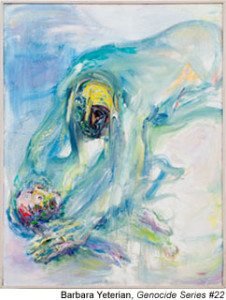On Tues., March 29, an academic conference titled “Forgotten Genocides: Memory, Silence, Denial” will be held at Rutgers University in Newark, N.J. Organized by Rutgers’ Center for the Study of Genocide, Conflict Resolution, and Human Rights (CGCHR), and Bergen Community College’s Center for Peace, Justice, and Reconciliation (CPJR), the conference will be comprised of seven panels.

Following welcoming remarks by Steven Diner, chancellor at Rutgers University, the first panel, “Forgetting and Remembering”—scheduled for 8:35 a.m.—will feature five presenters: Erica Lehrer, history/anthropology, Concordia University (Canada); Daniel Feirstein, sociology, UNTREF (Argentina), whose presentation is titled “Thinking Beyond the Binary Model: National Security Doctrine in Latin America as a Way of Rethinking Genocide as a Social Practice;” Doug Irvin, CGCHR; Alexander Hinton, CGCHR/anthropology; Thomas LaPointe, CPJR/English, Bergen Community College. The latter three will present “Hidden Genocides: Power, Knowledge, Memory.”
The second panel, “Power, Knowledge, and Memory,” chaired by CGCHR’s Aldo Civico, will begin at 10 a.m. and will feature two panelists: Carol Kidron, anthropology, University of Haifa (Israel), on “Cambodian-Canadian Inspirational Tales of Survival: Treading the Margins of Remembering and Forgetting Genocide Suffering;” and Hannibal Travis, law, Florida International University, on “Constructing ‘The Armenian Genocide’: How Genocide Scholars Unremember the Assyrian and Greek Massacres and Deportations of 1914-23.”
The third panel, on “Power, Resistance, and Indigenous Peoples,” will begin at 11:30 a.m. with three panelists: Frank Chalk, history, Concordia University (Canada), on “Indian Residential Schools in Canada: The Issue of Genocide and Public Policy;” Chris Mato Nunpa, indigenous studies, Southwest Minnesota State University, on “Nits Make Lice: Genocide and the Destruction of Indigenous Peoples of the United States;” and Donna-Lee Frieze, philosophy, Deakin University (Australia), on “Remembering Benevolence, Forgetting Genocide: The Stolen Generations in Australia.”
Panel four, “Identity and Difference,” chaired by Isaias Rojas-Perez, CGCHR/anthropology, will begin at 2:30 p.m. Dirk Moses, history, Eastern European University (Italy), will present “Has the Holocaust Helped Us Remember or Forget Genocides?” Krista Heghburg, anthropology, United States Memorial Holocaust Museum, will discuss, “What the Law Does Not Recall: Repair, ‘Historical Reality’, and the Legal Order in the Czech Republic.”
The fifth panel, “Memory, Silence, Denial,” scheduled for 4 p.m., will have two presenters: Adam Jones, political science, University of British Columbia Okanagan (Canada), on “The Great Lakes Genocides: Forgotten Histories, Forgotten Precedents;” and Elisa von Joeden-Forgey, history, University of Pannsylvania, on “Forgetting Genocide Before it Happens: Genocidal Categories and German Political Culture Before World War I.”
“Museum Exhibition,” the sixth panel, will begin at 5:15 p.m. and will be chaired by Nela Navarro, CGCHR/modern languages at Rutgers. Igor Kotler, the director of the Museum of Human Rights, Freedom, and Tolerance, will present “From a ‘Crime Without a Name’ to ‘Genocide’: The Simele Massacre of Assyrians, Iraq, August 1933.”
The seventh and final panel, “Hidden Genocides,” will be chaired by Alex Hinton, CGCHR/anthropology, Rutgers, and will begin at 7 p.m. The two panelists are Walter Richmond, languages, Occidental College, on “Circassia: A Small Nation Lost to the Great Game;” and Greg Stanton, conflict resolution, George Mason University, on “The Ukrainian Genocide: Why Marxist Genocide Scholars and Journalists Ignore and then Deny Genocides Committed by Marxist-Leninist Regimes.”
Taner Akcam, history, Clark University, is the keynote speaker of the conference. His lecture, titled “Why the Armenian Genocvide Was Forgotten: Turkish conceptions of National Security and History,” will be held on March 28 at 7 p.m.


Please let us know if there will be any published papers on this very important conference. The entire list of speakers is outstanding. Will we be able to follow any of it on-line?
This is good. It’s on a Monday, I should like to go.
Seervar; You are so fortunate to be able to go. These academics are absolutely tops in their field. And Taner Akam is going to present! This conference is going to be worth taking the day off work, or whatever it takes to go. For those of us who are thousands of miles away, will you please ask conference organizers if there is going to be any publication of papers presented? We could all then beg the Armenian Weekly to publish the papers. Or sell us copies.
Dear Perouz, I will certainly ask the panel if they could have publication of paper for you people that are thousands of miles away. Unfortunately I have two classes on Tuesday and I would love to go on Tuesday also; but I don’t know what I’ll do.
thank you, Seervart. I envy you the wonerful experience you will have. Will you share your observations with us when you come back? I notice that Armenian Weekly has just published papers from the ARF first 120 years conference, so they would probably do this one too if the presenters agreed to publication.
Don’t envy me so much Perouz jan. Yesterday I had an accident and I am not well enough to be able to go and to drive for an hour or so. It’s too bad but I don’t think I’ll be able to go.
I am so sorry about your accident, Seervart. Get well soon. The Cause needs your voice.
Thank you Perouz. I’ll see how I feel until then. I would’ve loved to go, but if I feel any better then I’ll go, we’ll see.